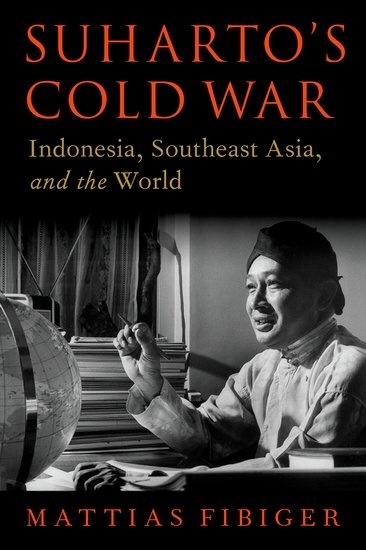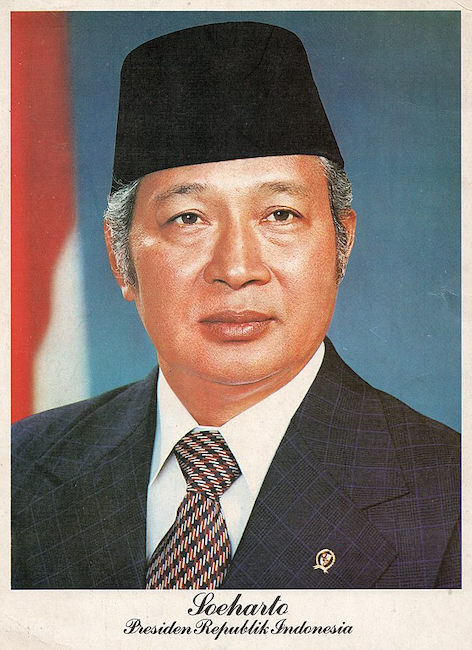Virdika Rizky Utama
Suharto, Indonesia's second president, is a prominent figure in Southeast Asian history and politics, known for his three decades-long authoritarian rule, corruption, and developmental initiatives. Suharto rose to prominence following the September 30th Movement (G30S), in which six generals and an officer were killed. While serving as Commander of the Army Strategic Reserve Command (Pangkostrad), his strategic handling of the incident marked his entry into national politics. Suharto's ascendancy, replacing Sukarno amid political and economic chaos, has been a subject of great scholarly interest. Mattias Fibiger, a researcher in international relations and political economy from Harvard Business School, delves into Suharto's tactics in the global political arena in his book Suharto's Cold War: Indonesia, Southeast Asia, and the World (2023), offering an analysis of Suharto's methods to gain and sustain power.
Fibiger begins his book with an exposition of Indonesia's divided domestic politics in the early days of independence and its links to the Cold War. At that time, Sukarno and the Indonesian Communist Party (PKI) had close ties with the Soviet Union and the People's Republic of China. Conversely, the Indonesian military maintained relations with the United States (US). US military aid to Indonesia tripled to USD 15 million in 1958-1959.
Prior to the outbreak of the G30S coup movement, Indonesia's international politics were increasingly biased towards the Eastern Bloc of communist countries. The development of the PKI as a communist party with the largest mass base outside the communist countries worried the West, led by the US, prompting it to pay attention to Indonesian politics.
With the support of the US, Suharto finally initiated a coup through the G30S in 1965, while accusing the PKI of being the mastermind behind the coup attempt. Along with the accusations against communists, Suharto organised systematic steps to exterminate PKI sympathisers and Soekarno supporters. Scholars including John Roosa and others, estimate that between 500,000 and 3 million people were killed due to the crackdown. Fibiger's analysis is particularly compelling when he examines the 1965 coup, known as the G30S event. While historical accounts, including those by scholars like Roosa, have estimated the huge and tragic loss of lives in the anti-communist purges that followed, Fibiger approaches these figures with a critical eye. He meticulously examines these estimates with new archival data, offering a revised understanding of the event’s scale and its geopolitical implications.

His analysis confirms the probable number of victims documented by Roosa and others, and goes further to uncover the diplomatic work of not just the USA, but also the UK, The Netherlands and the Indonesian army, at the time, including requests for a great deal of aid. Whilst these nations responded, but they did so cautiously, wanting to make sure Suharto was successful and there was no counter-attack from Sukarno and his loyalists before committing to too much. Fibiger probes deeper into the motivations behind the US's support for Suharto, challenging the reader to consider the complexity of international alliances and their impact on domestic affairs.
Where Fibiger makes his most significant contribution to understandings of this period in history is in his interpretation of Suharto's political strategy. He posits that Suharto was not just reacting to the circumstances but was actively shaping his domestic and international policy to secure his position within the global Cold War context. This perspective is a significant departure from the more common narratives that portray Suharto as primarily a beneficiary of external circumstances. Fibiger argues that Suharto's actions, including the alignment with the US and the systematic suppression of PKI sympathisers, were part of a calculated strategy to leverage global Cold War tensions in favour of his regime's stability and legitimacy.
Fibiger describes the lobbying around this time carried out by Suharto, Adam Malik, and Ali Murtopo to persuade the leaders of Southeast Asian countries to join ASEAN. Discussions about forming such an organisation and normalising relations between Indonesia and Malaysia had been going on since mid-1965 and finally realised under Ali Murtopo’s leadership in 1966. The consolidation of Southeast Asian countries to ward off communism has also been noted by Frank Mount in his book Wrestling With Asia: A Memoir (2012), an Australian agent involved in building anti-communism networks in the region.
Alongside the expansion of international networks, domestically Suharto also shifted focus, prioritising the economy as the central element of his governance. This approach marked a significant departure from Sukarno's strategy, which placed politics at the forefront. By emphasising economic development, Suharto aimed to garner public support, convincing the populace that his administration, alongside the military, was capable of enhancing their welfare.
Early in his tenure as president, Suharto faced staggering economic challenges, including a 650 per cent inflation rate in the period between 1965 and 1966. To combat this, he initiated the Five-Year Development Plan (Repelita) aimed at economic growth. Confronted with insufficient funds, Suharto sought aid from global economic entities like the Intergovernmental Group on Indonesia (IGGI), the Paris Club, the IMF, and the World Bank. These institutions provided financial support and demanded economic liberalisation and structural reforms. IGGI was formed in 1967, and the Paris Club, an assembly of creditor nations, was instrumental in addressing Indonesia's financial crisis and foreign debt, respectively. Suharto negotiated debt restructuring with the Paris Club by proposing fiscal reforms to the IMF, thus securing development funds.

Mattias Fibiger's analysis highlights how Suharto navigated the Cold War era, leveraging international capital and the global political landscape to bolster his regime. However, his strategies faced hurdles, , including rising international human rights scrutiny posed challenges to Suharto's authoritarian rule, especially regarding political detentions post-1966 coup.
The 1970s marked a pivotal period in Suharto's Cold War strategy. Nixon's engagement with China and the Soviet Union in the early part of the decade, coupled with the Third Indochina War and the end of Portuguese rule in East Timor in late 1975, eroded the anti-communism pretext Suharto had employed in the 1960s. Furthermore, the rise of the Transnational Islamic Movement in countries like Iran, Libya, and Saudi Arabia introduced new concerns for Suharto, leading him to perceive Islam as a potential threat.
This shift in focus was highlighted by Ali Murtopo in 1975, where he asserted that Islam, rather than communism, would emerge as the primary challenge in the following decade. This viewpoint was further emphasised in the early 1980s by his close advisors Jusuf Wanandi and Hadi Susastro from the Centre for Strategic and International Studies (CSIS), indicating a strategic re-evaluation of regional threats. Fibiger interprets these statements as indicative of a significant pivot in the strategic concerns of Indonesia's leadership, moving away from the Cold War's binary conflict between communism and anti-communism towards new geopolitical and internal challenges.
It can be seen that Suharto was not only a product of the international system but also an agent of change within that system. In this sense, the Suharto regime, built and sustained during the Cold War era, played an important role in shaping the balance of power in the Southeast Asian region and the regional response to the threat of communism.
The impact of the Cold War has shaped the contours of modern geopolitics and geostrategy and left an imprint on the political, economic, and social fabric of many countries, including Indonesia. Contemporary geopolitics, while no longer dominated by the bipolar conflict between the United States and the Soviet Union as in the Cold War era, is still influenced by great power dynamics. Today, global competition is primarily between the US and China, seeking to influence countries worldwide.
As a country that sits between two great powers, China and the US, and an important country in ASEAN, Indonesia plays a strategic role in the balance of power in the region. Its position affects how it interacts with major powers and organises its foreign policy.
Fibiger's book provides valuable insights into how the history of the Cold War and its influence on Indonesian politics and economics can help us understand the dynamics of geopolitics today. While conflicts and contexts change, the patterns and strategies used to deal with international pressures and navigate geopolitics often have deep historical roots.
Mattias Fibiger, Suharto's Cold War: Indonesia, Southeast Asia, and the World, and the World, Oxford University Press, 2023.
Virdika Rizky Utama (virdirainhard@gmail.com) is a PARA Syndicate Researcher (Indonesia) and graduate student in political science at Shanghai Jiao Tong University.











